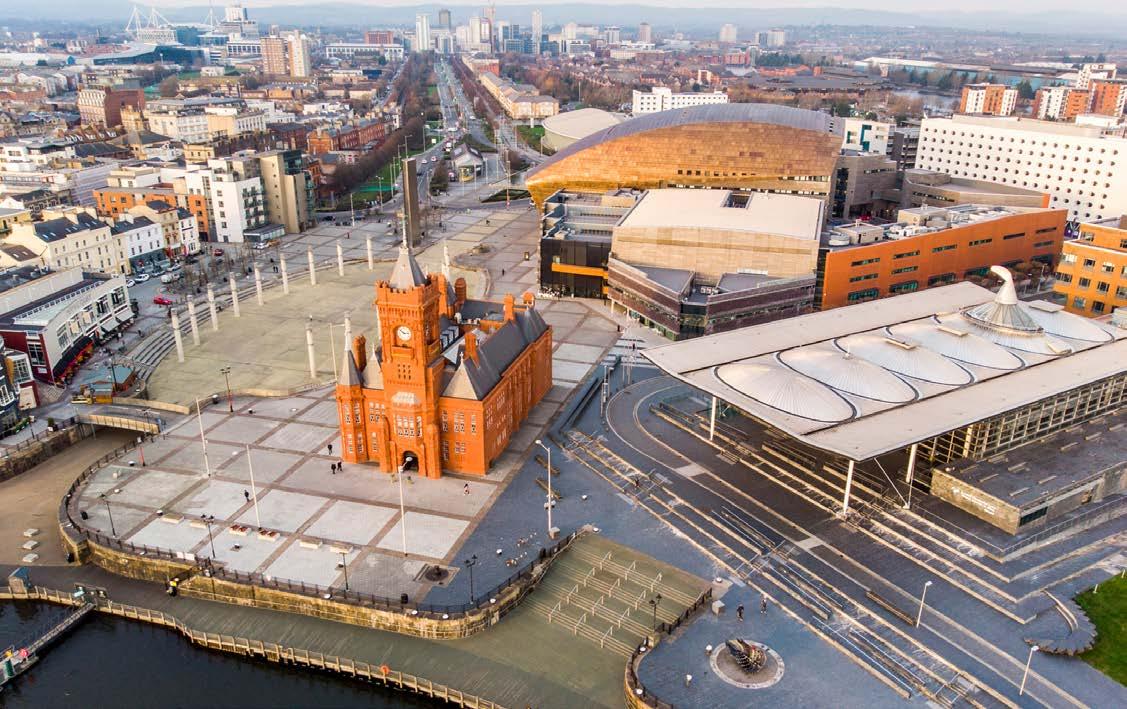

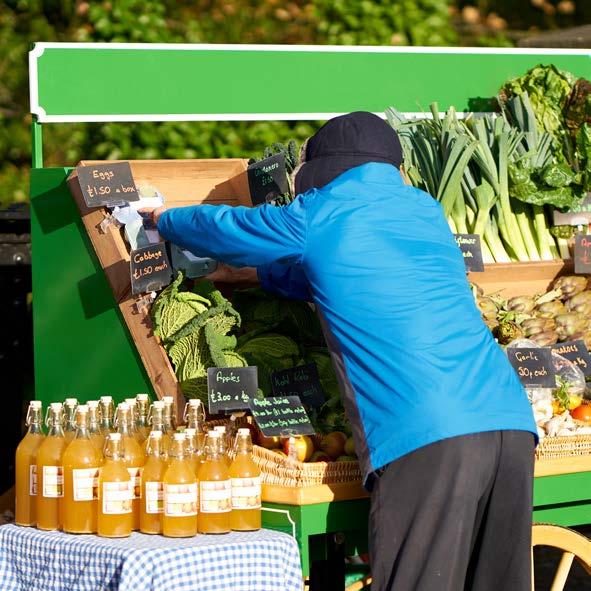
fsb.wales June 2020 @FSB_Wales OPEN FOR BUSINESS: REPURPOSING PUBLIC SPACES FOR ECONOMIC RECOVERY
Dr Llŷr ap Gareth
FSB Wales: Open for Business: repurposing public spaces for economic recovery 2 INDEX Introduction 3 The Problem 4 Opening up Arts and Recreational Space 6 Support for protective measures and PPE 7 The Welsh Legislative Context for Public Spaces 8 What powers need to change – Empowering communities 9 Synergy with Welsh Government agenda 10 Councils’ role in recovery 12 Next Steps 13 Conclusion .................................................................................................................................................................. 14
INTRODUCTION
Our towns have always been a crucial part of everyday life in Wales, playing a significant but often underrated role in driving economic development and providing the context for businesses to grow and thrive. During the Covid-19 crisis, with lockdown measures reducing our physical exposure to a wider area, our local communities have become essential support to our social and economic wellbeing and helping individuals and businesses through the crisis.
Towns are where we access public services, from GP surgeries to libraries or foundational economy businesses like childcare. Businesses are a key part of what makes a town tick in the good times and the bad.
Many town centre businesses such as butchers, bakers and grocery stores have adapted their businesses to help vulnerable or shielded people get their essentials delivered to their door. They have remained open, in difficult circumstances, and provided a measure of community resilience. As we exit lockdown and restrictions ease, our towns will need to play a different role to that which they have played in the past. Previously, increasing footfall was a sign of a healthy high street, now towns will need to be smarter and more cohesive to support their broader community.
FSB Wales’ 2018 report The Future of Welsh Towns highlighted the vital role SMEs play as embedded parts of the local economy and is even more important today than it was then. It is vital that initiatives such as the Business improvement Districts (BIDs), Town Councils or new community partnerships are given sufficient resources to guide this process but it will need a wider collaboration among community actors.
In our recent report Reopening Wales, we advocated that Welsh Government should use its £90m Transforming Towns programme to help reshape our towns for the recovery. This should mean helping our towns to adapt to social distancing rules, protecting Business Improvement Districts that are already established and helping towns to create a vision of their future in the recovery phase.
This document develops this thinking further, by looking at the practical steps needed for recovery. It considers giving local communities ownership and control over the recovery and supporting their local SMES, as well as the governance and regulatory aspects that need to be addressed in order to achieve this vision.
fsb.wales 3
THE PROBLEM
It is highly likely that social distancing measures will remain in place for the near future, and they are bound to affect our way of life substantially and put limits on social interaction. This has repercussions for social life, trade and business and all kinds of everyday leisure cultural and physical activities.
Social distancing rules will place particular responsibilities on businesses in how to use space, with restaurants, pubs and areas of social activity being particularly hit. Some bars and restaurants may lose up to two thirds of their covers, and so become no longer viable in the short to medium term if left without support. While ensuring the safety of employees and customers is of paramount importance, we cannot lose sight of the fact that these measures will ask significant questions of particularly the smallest businesses.
In our recent report Reopening Wales, we have called for a social distancing grant fund for businesses needing to make substantial changes to their properties and spaces at substantial cost to adhere to the new guidelines. At a time when smaller businesses face unprecedented challenges to available finance, support for substantive alterations will be required.
At the same time, support could be harnessed through local communities, within which SMEs are particularly embedded. There may be opportunities for them to use community assets or public space to help SMEs particularly affected in the immediate future. Both involving communities in the process, and marketing the new spaces to the public, would encourage communities to support local businesses and help their towns recover.
Consumers’ public health fears in the period as we ease from lockdown will likely dampen demand. It is important that people can feel safe to engage in activities such as dining out with friends and family. Community coordination and cohesion will provide the trust that will help those local communities themselves be a catalyst for recovery.
As such, local communities are the first group that need to be harnessed to help provide a stimulus, and there needs to plans in place to do so.
Public spaces to be used temporarily for SMEs under social distancing restrictions
The changed use of public spaces can in principle be deployed anywhere. Welsh councils have potentially strong public rights of way emergency powers. In principle, local communities should be able to harness public spaces to support SMEs in their area, repurposing these areas in order to do so.
There are already examples of this being used in some cities internationally:
Vilnius, Lithuania has turned its public spaces into open air café areas to be used for free by SMEs. This has also been prompted by the challenges faced by the narrow streets of its Old Town, which is UNesco heritage site.
Barcelona has lowered its taxes on outside spaces by 75% to incentivise use of more space on its main streets, and allowed more space available for outdoor seating.
Planning and engaging on how best to do this can also bring together communities. There is the potential that the local community can then provide a stimulus by viewing supporting SMEs locally as a civic duty. Depending on the type of temporary use, other local businesses can also benefit –for example, in the procuring of gazebos and heaters or temporary street furniture where suitable. While the Welsh weather poses a challenge, other countries in colder climates are adapting, and the solutions may be able to drive further business locally.
FSB Wales: Open for Business: repurposing public spaces for economic recovery 4
What spaces could be repurposed?
Local people will have the best understanding of spaces that could be repurposed, and so the view of governance and regulation must follow from this assumption.
Below are some examples of areas in different towns that could be repurposed. Local communities could easily do this, and it is a matter of harnessing local knowledge and imagination, and removing barriers to local community solutions.
It should be noted that local knowledge can go into more detail. Many will have explored many new parts of towns in the allotted daily exercise during the lockdown. This experience can be used and should lead to suggestions of back alleys behind streets of cafes and pubs that could be ‘spruced up’ and given an awning for outdoor seating. Locals would hopefully support the spruce up, and make use of the spaces created.

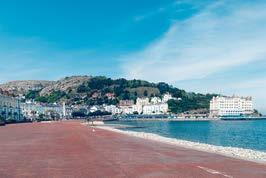
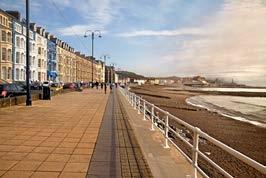
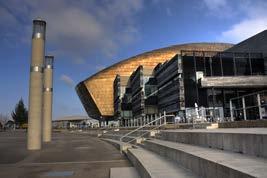
fsb.wales 5
MAESTEG MARKET & TOWN HALL
CITY CENTRE
BANGOR HIGH STREET CARDIFF
CAERNARFON SQUARE ABERYSTWYTH SEAFRONT
SEAFRONT WREXHAM HAVERFORDWEST TOWN SQUARE NEWTOWN HAY-ON-WYE
MAES
LLANDUDNO
OPENING UP ARTS AND RECREATIONAL SPACE
There are social activities and areas that are of cultural importance (performing arts; sports areas; mass gathering venues) which are likely to be among the last to reopen. In some towns, these community arts venues have been a vital part of regeneration, have provided artistic hubs and cultural events locally and importantly, play a vital role in enhancing individual and community wellbeing. These hubs have lost a huge portion of their income. It may be possible that these spaces can be used to mutual benefit in some areas of trade and business, providing space to make up for limitations in the wider market, as well as potentially providing a temporary source of revenue for vital community hubs.
This suggestion provides a stopgap opportunity for businesses to reopen more successfully under social distancing regulations, whilst also supporting the community hubs that would be a huge loss were they forced to close due to the economic impact of Covid-19.
Wales: Open for Business: repurposing public spaces for economic recovery 6
FSB
SUPPORT FOR PROTECTIVE MEASURES AND PPE
There should also be support available for changes that will require significant outlay for business. This would encourage the use of clear screen barriers. For example, where space is tight for staff, air-filtering systems may need to be installed (which given the size of some premises it is unlikely that a business could afford).
Advice should also be clear, taking into account the availability, relative need, and suitability of types of Personal Protective Equipment. It is important to ensure that PPE is available to ensure the safety of employers and employees, but it is also important that a sudden rise in demand does not make it more difficult for health workers to get the PPE they need.
It is also possible, to make a benefit out of a problem in providing new experiences, such as seen in the Dutch example above.
A Local Stimulus Voucher Plan
Example: Vilnius, capital city of Lithuania has provided a stimulus for the city’s restaurants while giving a reward to their health workers, by giving the city’s public health workers €400,000-worth (£350,000) of restaurant vouchers. This is intended both as gesture of thanks for their work and a much-needed stimulus to the city’s cafes and restaurants.
As the example in the pop out above shows, it is possible to both provide a gesture of thanks to our health and essential workers through a voucher, which will also provide a stimulus to local businesses.
There is an argument that a small voucher (as little as £5) to all local residents may serve a good purpose in nudging consumers to return to public life and spend in local businesses generally. It would itself serve as a nudge and signal from authorities that their support for local business is welcomed and seen as akin to civic duty. How this is redeemed is a question – but it maybe that businesses will be happy to absorb a portion of the cost themselves and so it would pay for itself to some extent – BIDs may be a good means by which to coordinate a voucher scheme, and an app version could be explored.
Other examples of voucher systems
In Rabot District, Ghent, Belgium, the residents of can earn and spend the vouchers ‘Torekes’ in their local shops, by taking part in the upkeep of dilapidated public spaces. This provides a link between the community developments of the area, promoting community ownership, and provides a stimulus to trade in the area for businesses that provide and retain local value.
fsb.wales 7
THE WELSH LEGISLATIVE CONTEXT FOR PUBLIC SPACES
Since the beginning of the crisis, UK Government, Welsh Government and Local Authorities have acquired significant new powers in order to protect public health.
In March 2020, UK Government, in consultation with the devolved governments, published the Coronavirus Bill. This included far reaching powers to protect the NHS and initiate lockdown, but for the purposes of this discussion it also aims at
“Containing and slowing the virus – by reducing unnecessary social contacts, for example through powers over events and gatherings, and strengthening the quarantine powers of police and immigration officers”
Significantly, the
“Legislation will be time-limited – for 2 years – and not all of these measures will come into force immediately. The bill allows the 4 UK governments to switch on these new powers when they are needed, and, crucially, to switch them off again once they are no longer necessary, based on the advice of Chief Medical Officers of the 4 nations.”
The two-year timeline allow the legislation to be switched on and adapted to different needs as we (hopefully) move into reopening and recovery phase. It is noted, “The measures in the coronavirus bill are temporary, proportionate to the threat we face, will only be used when strictly necessary and be in place for as long as required to respond to the situation.” We would argue that the economic recovery phase will require drastic actions to help SMEs back on their feet.
Following on from this UK-wide legislation, the Welsh Government has released
The Health protection (Coronavirus Restrictions) (Wales) Regulations 2020
Emergency legislation on Covid 19, approved by the Welsh Assembly (now Senedd) on March 24th 2020, gives UK and devolved governments what First Minister Mark Drakeford called ‘powers not normally seen in peacetime’, with a sunset clause of 2 years (24th March 2022). The new law would allow authorities to:
• Take people into or keep them in quarantine, or direct a person to attend a designated place
• Restrict or prohibit mass gatherings
• Close premises
The bodies (known as ‘relevant bodies’) entitled to do this are:
• county or county borough councils,
• Natural Resources Wales,
• National Park authorities
• the National Trust
In principle, as we move to the recovery phase this legislation could be adapted and extended to repurposing the use of public spaces for businesses, as the rationale would remain the same, in regulating public spaces for public safety, while promoting safe reopening. So, this legislative framework could and should be adapted to manage and make safe social gatherings and regulating premises, but also in order to repurpose and reallocate streets for use by businesses and to increase the chances for our communities to thrive, and ‘build back better’.
FSB Wales: Open for Business: repurposing public spaces for economic recovery 8
WHAT POWERS NEED TO CHANGE – EMPOWERING COMMUNITIES
The above framework provides for empowering local and town councils to be able to provide solutions on the local scale. It is important to note that these should be clearly on a temporary basis, and that the point is to reallocate public space for local needs, and not earmark any for future development.
A clear policy need and response at this scale can provide a catalyst for bringing these arrangements to fruition.
• Where possible regulations should be lifted in areas such as licensing laws in public spaces to facilitate the safe return to public life.
• On a temporary basis, regulation around street and town design such as the need to fit to a particular aesthetic should be relaxed, with the proviso that any street furniture should be done so on a temporary basis, and the nature of these structures (e.g. awnings) would be temporary.
• There should be a means by which to review whether unexpected issues arise from any reallocation.
• There should be a sunset clause in place, and should align with the emergency powers Welsh Government acquired in March 2020.
• In order to facilitate any disputes and in outlining the design and coordination of the response there should be a Town Coordinator. This role will require being able to resolve conflicts, in allocating land space according to need, and issues such as liaison with community policing about the adherence to social distancing guidelines. This may require some statutory role. There are some foreseeable difficulties for businesses and this can provide a focus for working together. For example, with a row of businesses on single street, queueing may be difficult. Moreover, small businesses will not in every case be able to replicate the role of bigger businesses in having a worker to coordinate entry. In this situation planning on how to pool resources, and having a Town Coordinator would be a useful intervention.
Where BIDs are in place, they can provide a suitable mechanism for moving forward. However, we should not disenfranchise areas where BIDs have not been put in place, and this could provide a catalyst to community engagement. This could be in the shape of new BIDs, through Town Councils, through local fora, or through arm’s length body in partnership with Local Authorities. The important thing is to ensure a clear engagement and point of contact with the local community and to gain their ideas on what is the best way to use public space.
Towns should also look to utilise existing social media groups to gain ideas and support such as local Facebook groups for instance.
fsb.wales 9
SYNERGY WITH WELSH GOVERNMENT AGENDA
The coronavirus crisis clearly requires us to think differently, and to unlock the potential of communities to recover for themselves.
However, despite the unique situation, this vision also aligns with much of the Welsh Government’s wider agenda. In this respect at least, the crisis is an opportunity and a potential catalyst for bringing ideas to practical fruition.
There are also some difficult decisions and trade-offs that may be needed in the immediate recovery period. On balance, we believe that the benefits outweigh the problems, and that sensible policies can mitigate any unintended consequences that emerge.
In terms of advantages, this aligns well with the aims of localism and community cohesion, in that it seeks to engage communities directly in solutions to the problems caused by the pandemic, and looks to bring people together to view supporting local businesses as a civic duty.
Our vision aligns well with the foundational economy approach as it looks to support the everyday economy, that are not always counted when looking at the economy through the productivity lens alone. It is also important in reinforcing aspects of civic and public engagement, and support for local SMEs and the local economy, while empowering those communities to do that for themselves insofar as possible.
Clearly, a policy approach that promotes cross-sectoral working and partnership also aligns well with wider well-being goals. What successful recovery looks like can also be aligned with well-being budgetary principles, with measures that could be an indication of how local businesses and community are recovering in a way that is sustainable and provides a string foundation to the rebuilding local economies.
Community cohesion and a focus for community policing and enforcement of the rules through partnership in BIDs would be a sensible way of looking at community policing and providing a means by which business can engage with police on the challenges of the coronavirus regulations.
In terms of the environment and air quality, the recovery principles could also align with carbon budgets. Clearly, a move toward closing streets and pedestrianisation to facilitate social distancing will incentivise walking and cycling and so help with Active Travel. The reduction in these centres of traffic would have a good effect on air quality – there are limits that need to be acknowledged with this latter point, in terms of public transport and private car use, which may be safer in the short-term. Clearly a balance is needed on this aspect.
We would note that reopening has an equality aspect – it is the least well off who live in poorer housing, and may well be most hit by unemployment due to a recession. An approach that looks to provide economic development and job creation during the recovery phase, following the crisis response of furloughing and retaining employment, is more sustainable and provides a stronger foundation for the future than only a ‘defensive’ view of retaining jobs.
There will also be difficult decisions and trade-offs.
FSB Wales: Open for Business: repurposing public spaces for economic recovery 10
The impact on demand for public transport – which SMEs in town centres have always wanted to be better and more efficient, means that in the short term there may be limitations on the modal shifts during the initial recovery period (which is not to say that developing public transport should not happen), as commuters and visitors prioritise the safe ‘bubble’ of the car to other transport. The fact that in Wales, the elderly will be particularly vulnerable and so disincentivised from using their bus pass will have a particular impact on public transport revenue.
As this develops, there will need to be approaches to difficult bottleneck times such as when pubs will require customers to be inside, so as not to cause noise pollution. There must be personal responsibility and public understanding in this situation also.
There will be questions around levels of openness of spaces (e.g. pavements, seafronts) and questions around street furniture. It is possible to view these situations as short-term measures where the long-term benefits outweigh the short-term costs. However, clearly, there will be concerns from some vulnerable groups and these should be mitigated as far as possible. Such foreseeable problems also emphasise the need for strong local public involvement
Sunset clauses perhaps mirroring the two years of Covid-19 emergency for each of the four national governments in the UK, should be operational. This should reassure that any trade-offs are temporary and in response to the urgent emergency needs. This should be balanced with learning from the process and what works, as it could drive regulatory reform and underpin wider social good and localism.
On balance, we believe that with space now a premium that is likely to drive businesses out of operation in local communities, that these particular community needs and the advantages to foundational economic recovery in the short term outweigh the problems that will need mitigation. We believe that with this vision, the coronavirus could provide a catalyst to a strong local based economic recovery based on foundational principles and community engagement.
fsb.wales 11
COUNCILS’ ROLE IN RECOVERY
Councils have played a vital role in providing and implementing support through the initial crisis response, providing swift financial support through implementing the Welsh Government Business Grants, and through business rates holidays.
Their role will be key in coordinating the recovery, ensuring that there is consistency in approach while an awareness of different local challenges. Local authorities will also need to ensure that trust is retained in the safety of all activities and risk minimised, whilst building a route to recovery. Business voice in this process will be of utmost importance. We need to generate an approach in which businesses are vocal about the opportunities and challenges that will need to be addressed to ensure their survival. Councils will need to engage a proactive process to allow that voice to be sought and heard. The engagement process and practical approach to public space outlined here would help facilitate such discussions, and ensure that it is responsive to local needs and provides direction of travel and local buy-in for the process of recovery.
That trust is a reciprocal process – Councils need to allow local communities and town councils to arrange public space in the way that best serve their areas’ businesses and economic development. As such, it is vital for councils to call on Welsh Government to ease regulation on the use of public spaces and to allow for their repurposing in support of SMEs. It is also vital that councils support the spirit of this in enforcement and in allowing communities space to develop solutions, as well as sharing good practice from elsewhere.
The response in the reopening and recovery phase is an opportunity for reigniting local civic activity. This in turn provides for trust and a foundation and local demand for business and social activities. This can serve as a legacy and basis for future well-being approaches within the councils that can have an active network in place.
FSB Wales: Open for Business: repurposing public spaces for economic recovery 12
NEXT STEPS
Welsh Government should use its £90m Transforming Towns programme to help reshape our towns for the recovery. This will help our towns to adapt to social distancing rules, protecting Business Improvement Districts that are already established and building new institutions where necessary, and helping towns to create a vision of their future in the recovery phase.
As soon as possible, Welsh Government should look to relax on planning processes and regulation to allow communities to decide for themselves what is the best use of their public spaces. Councils should signal their support for this agenda, by calling on Welsh Government to ease regulation on the use of public spaces and to allow for their repurposing in support of SMEs.
The onus should be on freeing up these spaces on a temporary basis for active experimentation by the communities themselves in reallocating the spaces.
It should be made clear that this is a temporary solution to a community problem, and will not lead to the private purchase of any public spaces.
Where possible, Welsh Government should give a rough timeline (with the obvious qualifications of uncertainty due to the Coronavirus) so as to allow a lead in for communities to plan.
Councils should look to empower and build structures suitable to the towns themselves, including empowering suitable structures currently available, or encouraging new ones. They should look to develop a Town Coordinator role in every participating town. They should view their role as allowing communities who best know their spaces to decide on their use.
Employers should take the time to understand the guidance and take the opportunity to assess and plan on what they need in terms of space and support.
fsb.wales 13
CONCLUSION
“The country demands bold persistent experimentation. It is common sense to take a method and try it. If it fails, admit it frankly and try another. But above all try something.”
Franklin D Roosevelt, 1932
Covid-19 has already wrought huge damage to our communities, our families and friends, and to the anchor institutions in our communities.
It is our view that it is only through businesses, public and civic institutions, as well as our communities working together that we can harness the creative energies, the local knowledge and the support and expertise across Welsh society to rise to the challenge of rebuilding Wales. This document seeks to learn international lessons, and some creative responses SMEs have already put in place, and looking to how these can be developed and how everybody can be brought into the process to make our communities stronger for the future.
We think that a focus on the reallocation of public spaces to support local SMEs, with the trust and support of the local community, is a good starting point for coming up with solutions to the myriad problems Covid-19 has caused us all.
We do not claim to have all the answers. However, we hope that some of the ideas presented here can provide a stimulus for local communities to help provide their own solutions – and where one thing does not work, to learn the lessons and try another. By such an approach, we hope we can build a better, stronger local economy for the future.
FSB Wales: Open for Business: repurposing public spaces for economic recovery 14
fsb.wales 15
FSB Wales
1 Cleeve House, Lambourne Crescent
Caerdydd, CF14 5GP
T/Ff: 02920 747406
M/S: 07917 628977
www.fsb.org.uk/wales
Twitter: @FSB_Wales







